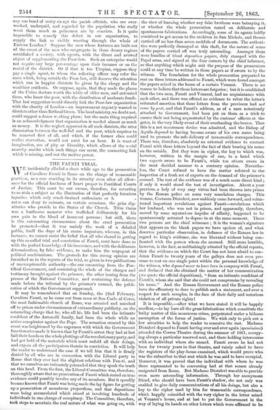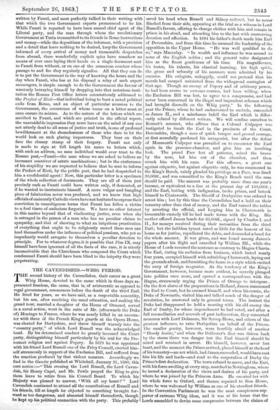THE FAUSTI TRIAL.
WE incidentally alluded a short while ago to the prosecution of Cavaliere Fausti in Rome on the charge of treasonable practices, as a case startling in its atrocity even after all allow- ance for the official hardness of heart proper to Pontifical Courts of Justice. This must be our excuse, therefore, for reverting to so stale a subject as the illustration of that perfectly ferocious injustice which only crack-brained enthusiasts or b
catas can deny to animate, on certain occasions, the grim dig- nitaries who preside in the States of the Church. Titus Oates was a loathsome monster who trafficked deliberately for his own gain in the blood of innocent persons ; but still, there is this extenuating circumstance about the cruel persecution he promoted—that it was mainly the work of a deluded public, itself the dupe of his coarse imposture, whereas, in this instance, we cannot resist the belief that all who shared in getting up this so-called trial and conviction of Fausti, must have done so with the perfect knowledge of his innocence, and with the deliberate determination, by false evidence, to make him the scapegoat of political machinations. The grounds for this strong opinion are furnished us in the reports of the trial, as given in two publications of unexceptionable authority—the one emanating from the Pon- tifical Government, and containing the whole of the charges and testimony brought against the prisoner, the other issuing from the presses of the National Committee, and containing the defence made before the tribunal by the prisoner's counsel, the publi- cation of which the Government suppressed.
It may be remembered that on Sunday, the 22nd February, Cavaliere Fausti, as he came out from mass at San Carlo al Corso, the most fashionable church of Rome, was arrested and marched off to prison under circumstances of extraordinary publicity, on the astounding charge that he, who all his life had been the intimate confidant of the Antonelli family, had been the whole while an active conspirator against the Pope. The sensation created by this event was heightened by the eagerness with which the Government functionaries made it known that by Fausti's arrest they had at last laid their hands on the whole plotting; of the revolutionaryparty, and had got hold of the materials which must unfold all their doings, and expose all the participators therein to conviction. It will help the reader to understand the case if we tell him that it is firmly denied by all who are in connection with the Liberal party in Rome that they ever had the slightest relations with Famti, and that we ourselves are intimately persuaded that they speak the truth on this head. From the first, the Liberal Committee was, therefore, thoroughly aware that no prosecution of Fausti which rested on true evidence could possibly involve any of its members. But it speedily became known that Fausti was being made the lay figure for getting up a prosecution of monstrous proportions, and that depositions were being accumulated which aimed at involving hundreds of individuals in one charge of conspiracy. The Committee, therefore, took steps to ascertain the real nature of what was going on, with
the view of learning whether any false brethren were betraying it, or whether the whole prosecution rested on deliberate and spontaneous fabrications. Accordingly, some of its agents boldly contrived to get access to the archives in San Michele, and thence carried off no less than seven sackfuls of documents. The authori- ties were perfectly dismayed at this theft, for the nature of some of the papers carried off was truly astounding. Amongst them were bundles of blank deposition papers, duly stamped with the Papal arms, and signed at the four corners by the chief informer, so that anything which might suit the purpose of the prosecutors could at any time be written in these papers as if sworn to by the witness. The foundation for the whole prosecution purported to rest on three letters addressed to Fausti, which were found amongst the papers seized in the house of a certain Venanzi. There is no reason to believe that those letters are forgeries ; but it is established that the two men, Fausti and Venanzi, had no acquaintance with each other, and there was offered no evidence to rebut the latter's reiterated assertion that these letters from the provinces had not come by post, and that Fausti's address, as of a man notoriously attached to Government, had been put on them as a trick to ensure their not being sequestrated by the customs' officers at the gates, in the very likely event of their overhauling the bearer. That this is a not uncommon device was admitted, and the Bishop of Aquila deposed to having become aware of his own name being used to promote the safe delivery of treasonable correspondence.. There was, therefore, absolutely no external evidence to connect Fausti with these letters beyond the fact of their bearing his name on the outside. But they were- in cipher, the key to which was, however, written in the margin of one, in a hand which two experts swore to be Fausti's, while ten others swore in the most decided manner to a contrary opinion. Neverthe- less, the Court refused to have the matter referred to the inspection of a fresh set of experts on the demand of the prisoner's counsel. The rest of the evidence was of a much more direct kind ;. if only it would stand the test of investigation. About a year- previous, a lady of very easy virtue had been thrown into prison by the Roman police on some very scandalous charges. This woman, Costanza Diotalevi, now suddenly came forward, and volun- teered important revelations against Fausti—revelations which her husband, who was not in prison, and apparently, therefore, moved by some mysterious impulse of affinity, happened to be spontaneously actuated to depose to at the same moment. These two persons are the chief witnesses ; it is the woman's signature that appears on the blank papers we have spoken of, and what deserves particular observation, in defiance of the Roman law in regard to king's evidence, she was liberated without being con- fronted with the person whom she accused. Still more horrible, however, is the fact, as unblushingly attested by the official reports, that the evidence on which the Court has not been afraid to con- demn Fausti to twenty years of the galleys does not even pre- sume to rest on one single point within the personal knowledge of the witness, who deposed never to have been in company with Fausti, and declared that she obtained the matter of her communication (we quote the official depositions), "from an intimate confidant of Fausti's, whom she said that she could not compromise by revealing his name." And the Roman Government and the Roman police have the effrontery to dare to publish such a statement, and aver a. respect for such scruples, in the face of their daily and notorious. violation of all private rights It is impossible,—after what we have stated it will be happily needless,—to lay bare all the gross fabrications which constitute the bulky matter of this monstrous crime, perpetrated under a hideous. assumption of the forms of justice. We wish only to pick out a few atrocities to help the reader to conceive the rest. Madame Diotalevi deposed to Fausti having over and over again (spessissimo) attended the Correa Theatre during the summer of 1861, occupy- ing always a particular reserved seat, and there holding intercourse with an individual whom she named. Fausti swore he had not been for twenty years in that theatre, and vainly asked to have the registers of the play-house examined, which would prove who was the subscriber to that seat which he was said to have occupied.. Moreover, it was proved that the individual with whom he was there represented to be conversing had at that season already emigrated from Rome. But Madame Diotalevi was able to provide even more astounding information. Through her anonymous friend, who should have been Fausti's shadow, she not only was enabled to give daily communications of all his doings, but also a key to the cipher used by him for treasonable correspondence, which happily coincided with the very cipher in the letter seized at Venanzi's house, and at last to put the Government in the way of laying its hands on other letters which were affirmed to be written by Fausti, and most perfectly tallied in their writing with that which the two Government experts pronounced to be his. While Fausti is reported to have been named chief agent of the Liberal party, and the man through whom the revolutionary Government at Turin transmitted to its friends in Rome instructions and money—while the depositions of the informer, with a precision and a detail that leave nothing to be desired, keep the Government informed of every arrival of money and treasonable despatches from abroad, these wonderfully explicit spies have somehow no means of ever once laying their hands on a single document sent to Fausti from without, or on one of the numerous couriers whose passage to and fro they regularly signalize. All that they can do is to put the Government in the way of knowing the hours and the day when Fausti, who has at his disposal a relay of such expert messengers, is simple enough to do the Government the favour of wantonly betraying himself by dropping into that notorious insti- tution the Roman Post Office letters ostentatiously addressed to the Prefect of Rieti—that individual being to boot a noted political exile from Rome, and an object of particular aversion to the Government, the occurrence of whose name on a 'letter must at once ensure its seizure. As to the nature of the letters which are ascribed to Fausti, and which are printed in the official report, the unavoidable impression they must leave on the mind Of any one not utterly dead to all sense of justice and truth, is one of profound bewilderment at the shamelessness of those who dare to let the world look on such glaring impostures. They bear on their face the clumsy stamp of their forgery. Fausti not only is made to sign at full length his name to letters which, with such an address, no sane individual would ever trust to the Roman post,—Fausti—the man whom we are asked to believe an incessant contriver of astute machinations ; but in the exuberance of his stupidity we are requested to believe that he sent to inform the Prefect of Rieti, by the public post, that he had despatched to him a confidential agent ! Now, this particular letter is a specimen of the whole collection of documents. They are all of them just precisely such as Fausti could have written only, if demented, or if he wanted to incriminate himself. A more vulgar and bungling piece of fabrication never was produced, and we know that high officials of eminently Catholic views have not hesitated to express their conviction in unambiguous terms that Fausti has fallen a victim to a foul tissue of audacious forgeries. We have no other interest in this matter beyond that of vindicating justice, even when she is outraged in the person of a man who has no peculiar claims to sympathy, and that of showing to what an iniquitous prostitution of everything that ought to be religiously sacred those men can lend themselves under the influence of political passions, who yet so impudently would arrogate to themselves a peculiar devotion to principle. For to whatever degree. it is possible that Pius IX. may himself have been ignorant of all the facts of the case, it is utterly inconceivable that the Churchmen who composed the Court which condemned Fausti should have been blind to the iniquity they were perpetrating.































 Previous page
Previous page